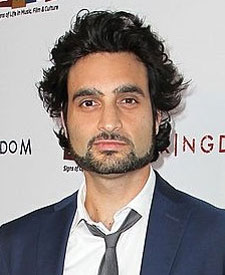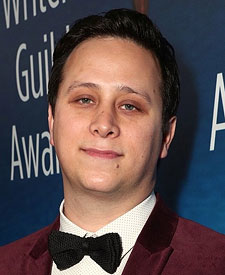Connect
Introducing the Middle Eastern Writers Committee
Co-chairs of the newly formed committee, Paiman Kalayeh and Cameron Fay, discuss the foundation of the committee and what lies ahead.
(10/16/2020)
While the Guild has established numerous member-driven committees to advocate on behalf of historically underrepresented writers, until recently, one group was missing from the mix: Middle Eastern writers. On August 31, the WGAW Board unanimously approved the formation of the Middle Eastern Writers Committee (MEWC), concluding a nearly decade-long journey.

MEWC Co-chair Paiman Kalayeh
In March 2011, WGAW member Paiman Kalayeh contacted the Guild’s Inclusion and Equity Department with the intention of forming a Middle Eastern Writers Committee. That July, the department hosted an initial member meeting, but only five members showed up, of whom three did not identify as Middle Eastern, displaying a discouraging lack of interest at the time.
Earlier this year, the Guild released its 2020 Inclusion Report, which showed that, while most major non-white groups were underrepresented in TV and film relative to their share of the U.S. population, Middle Eastern writers had "almost no representation at all." A mere 0.3% of working screen and TV writers identified as Middle Eastern. This stark data compelled Kalayeh, joined by fellow Middle Eastern writer Cameron Fay, to reignite the attempt to establish a Middle Eastern writer-centric committee. The two were determined to increase such low numbers in the industry.

MEWC Co-chair Cameron Fay
In August of this year, another exploratory meeting was held, this time drawing more than 50 self-identified Middle Eastern writers. At the meeting, the group unanimously approved a proposal to form an official committee. The WGAW Board formally approved the proposal soon after and appointed Kalayeh and Fay as co-chairs until the next CAP committee election cycle in 2022.
The mission of the MEWC is “to boost visibility and employment of Middle Eastern writers within the film and television industry, while celebrating and promoting accurate portrayals of Middle Eastern characters in all areas of media. [Committee members] also serve as an expert resource for productions on issues related to the vast and diverse Middle Eastern community in the United States and abroad.”
Via email, WGAW Connect interviewed MEWC Co-Chairs Kalayeh, an Emmy nominee whose writing credits include Sunnyside, The Cleveland Show, and Big Hero 6: The Series, and Fay, a Writers Guild Award nominee whose writing credits include Dance Camp, Brother Nature, and Life-Size 2, about the mission guiding the new committee and what can be done to increase Middle Eastern writers’ representation and bolster more accurate, authentic portrayals of Middle Easterners in film and television.
What are the factors that compelled you to form the WGAW’s Middle Eastern Writers Committee?
Kalayeh and Fay: We’ve both been working as professional writers for over a decade now, and we’ve grown increasingly frustrated by two main things. One, the negative depiction of Middle Eastern characters in film and TV. And two, the historical lack of employment opportunities for Middle Eastern writers. When each of us have pushed for employment as BIPOC writers, we’ve usually been met with pushback that we ‘don’t count.’ The WGAW Inclusion Report finally put hard numbers to what we had been feeling for years, and according to the data, Middle Eastern WGA writers are the lowest, only making up 0.3% of the total employment in film and TV. That number really lit a fire under us to form the committee.
What are the challenges that Middle Eastern writers face in the industry that have resulted in such historically low levels of employment, and how will the MEWC address these challenges?
Kalayeh and Fay: Well, first and foremost, when it comes to TV employment, Middle Eastern writers need to count as a minority. We’ve had multiple TV execs and lit agents tell us point blank that Middle Eastern people are actually considered ‘Caucasian’ because they don’t have a ‘Middle Eastern’ attribute box to check. That has to change. Pushing TV studios and networks to add a box to qualify as a diversity hire will be a start. From there, we need more writers making their way up the ranks and creating shows that authentically portray Middle Eastern characters.
This is not the first time WGAW members attempted to form a Middle Eastern Writers Committee. What made this recent effort more successful?
Kalayeh and Fay: Nearly ten years ago, Paiman tried to form the committee to no avail because it was extremely difficult to locate other Middle Eastern writers in the Guild. Now that the WGAW has included an attribute box to identify as Middle Eastern, it was much easier this time around. Plus, the current administration’s marginalization of Middle Eastern Americans, especially with the travel ban, probably helped increase turnout. We had almost 60 members attend the formation meeting. And they were energized. They were beaming, excited to meet writers just like them. It was beautiful and inspiring. We hope and plan to grow that number in the months and years to come.
How can the MEWC lead the way to more authentic and nuanced portrayals of Middle Eastern characters? What can all writers do—on or off the committee?
Kalayeh and Fay: It starts with boosting employment. We can’t lead the way to more nuanced portrayals of Middle Eastern characters if we’re not in the room, giving voice to those experiences. We also need to make sure that we’re being promoted in the room and not just getting stuck in lower to mid-level positions, so that eventually we can be in a position to create our own shows and films that bring that authentic perspective to mainstream audiences. Writers on and off the committee can help by hiring more Middle Eastern writers in general. We can write more than just Middle Eastern-centric stories and need to be taken more seriously by our peers.
The MEWC is set to host its first member meeting next week on Thursday, 10/22. If you’d like to attend, please RSVP here.
If you’re interested in joining the WGAW’s new Middle Eastern Writers Committee, please visit the MEWC webpage or contact the Guild’s Inclusion & Equity Department.
